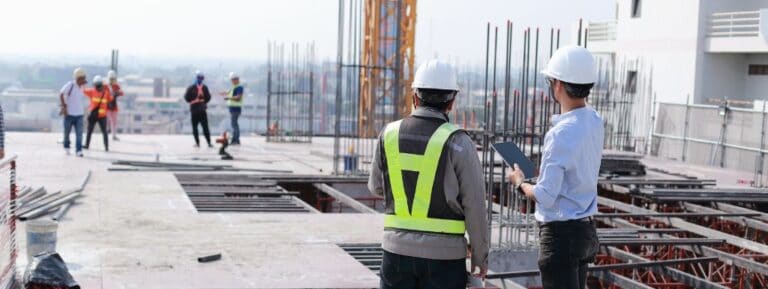The NSW Government passed two new pieces of legislation in June 2020, designed to ensure greater standards of construction for residential developments. The Residential Apartment Buildings (Compliance and Enforcement Powers) Act 2020 (NSW) (“RAB Act”) and the Design and Building Practitioners Act 2020 (NSW) (“DBP Act”) both attained royal assent on the 10th of June and will commence in stages throughout the next 12 months.
The legislation places a greater onus on the developers and design practitioners by apportioning responsibility to them where a building defect is discovered. The Government hopes the implementation of these Acts will regain public confidence in residential developments after substantial defects in new developments around Sydney made headlines in 2018. The RAB Act is focused on procedures and bestows powers to the regulator through the development process. While the DPB Act sets out to register and regulate design practitioners; assigning a duty of care and accountability around building defects. We detail the key takeaways of each act below.
The Residential Apartment Buildings (Compliance and Enforcement Powers) Act 2020 (NSW) Key Takeaways:
– The RAB Act is the first of its kind in Australia; establishing a requirement for developers to notify the Secretary of the Department of Customer Service (“the DCS”) at least six months, but no more than 12 months, of the intended completion of building work. This is intended to afford the Secretary time to make regular inspections prior to completion. Where a defect is discovered the DCS can withhold a building’s occupational certificate until rectifications are made by the developer.
– The RAB Act allows for a grace period of 60 days if expected completion is advanced or delayed. If the expected completion is moved beyond the grace period, the developer must submit a notice of change to the secretary within one week of his knowledge of the change.
– A failure to correctly file an expected completion notice with the Secretary may result in a maximum penalty of $210,000 for a body corporate or $42,000 in any other case.
– The definition of a “developer” for the purposes of the RAB Act includes “the person who contracted or arranged for, or facilitated or otherwise caused, the building work to be carried out”. If the building work is the erection or construction of a building or part of a building, the owner of the land is also taken to be a developer.
– The RAB Act was assented on 10 June and will commence on 1 September 2020. However, it should be noted that it will retroactively apply to buildings completed within the last six years. The date of the occupational certificate is the relevant consideration.
– If work is, or likely to be in contravention to the Act, the Secretary may issue a stop-work order. The RAB Act also sets out the process required to appeal against a stop-work order. Proceedings for offenses will be taken before the Local Court or before Land and Environment Court. (This applies to the DPB Act as well).
The Design and Building Practitioners Act 2020 (NSW) Key Takeaways:
– The DBP Act introduces a statutory duty of care for the benefit of landowners and places accountability for new and existing defective construction work. Any person who carries out construction work has a duty of care to avoid economic loss caused by defects relating to building or construction work.
– Construction work includes the construction of a building, making alterations or additions to a building, renovations, applying protective treatment, preparations of design, and building products used for the development of residential buildings.
– The DBP Act states that any design practitioner who makes a compliance declaration must be registered and qualified to do so. Major variations to designs must be declared as compliant before being provided to the builder. Registered building practitioners must build in accordance with these declared designs and issue a compliance declaration stating that the final building complies with the Building Code of Australia.
– Design practitioners will have responsibility for their designs that are ultimately relied upon for building work. A registered design practitioner must provide a compliance declaration if they prepare a regulated design for a person and that design is in connection with building work.
– Penalties of up to $420,000, two years imprisonment or both may apply for breaches of the DBP Act.
– The DBP has been written to comply and cooperate with other established legislations such as the Home Building Act, Civil Liability Act, Strata Schemes Management Act, Building Products Management Act, etc. Relatively, the DBP Act and RAB Act does not limit the rights and obligations set out in these acts.
– The DBP Act was asserted on 10 June, commencing partly on the same date and partly on 1 July 2021.
Who Does this affect?
The purpose of this reform package was to limit the risk of building defects from going unnoticed through the design and certification processes. It does this by placing a heavier burden of responsibility onto the design professionals for building defects. It is important if your business is involved in the development of residential dwellings that you are complying with the new regulations. This includes:
– understanding if you meet the registration and qualification requirements;
– consider how this may affect current and ongoing projects;
– be prepared for inspections and possible investigations; and
– form an action plan around the process of stop-work orders.
These changes also affect landowners within residential buildings that have experienced calamity as a result of a building defect. If you have experienced economic loss as a result of a building defect within the last 6 years you may be entitled to reasonable compensation.
We are here to help
Understanding how the new legislation may affect you can be difficult. We are committed to keeping you updated with relevant updates on legislation that may affect you and your business. Should you require further advice on this current matter or others, we would be delighted to assist.
Contact us today at:
Email [email protected]
Telephone 9307 8900
Address: Rostron Carlyle Rojas Lawyers
13.05, 88 Phillip Street
Sydney NSW 2000



